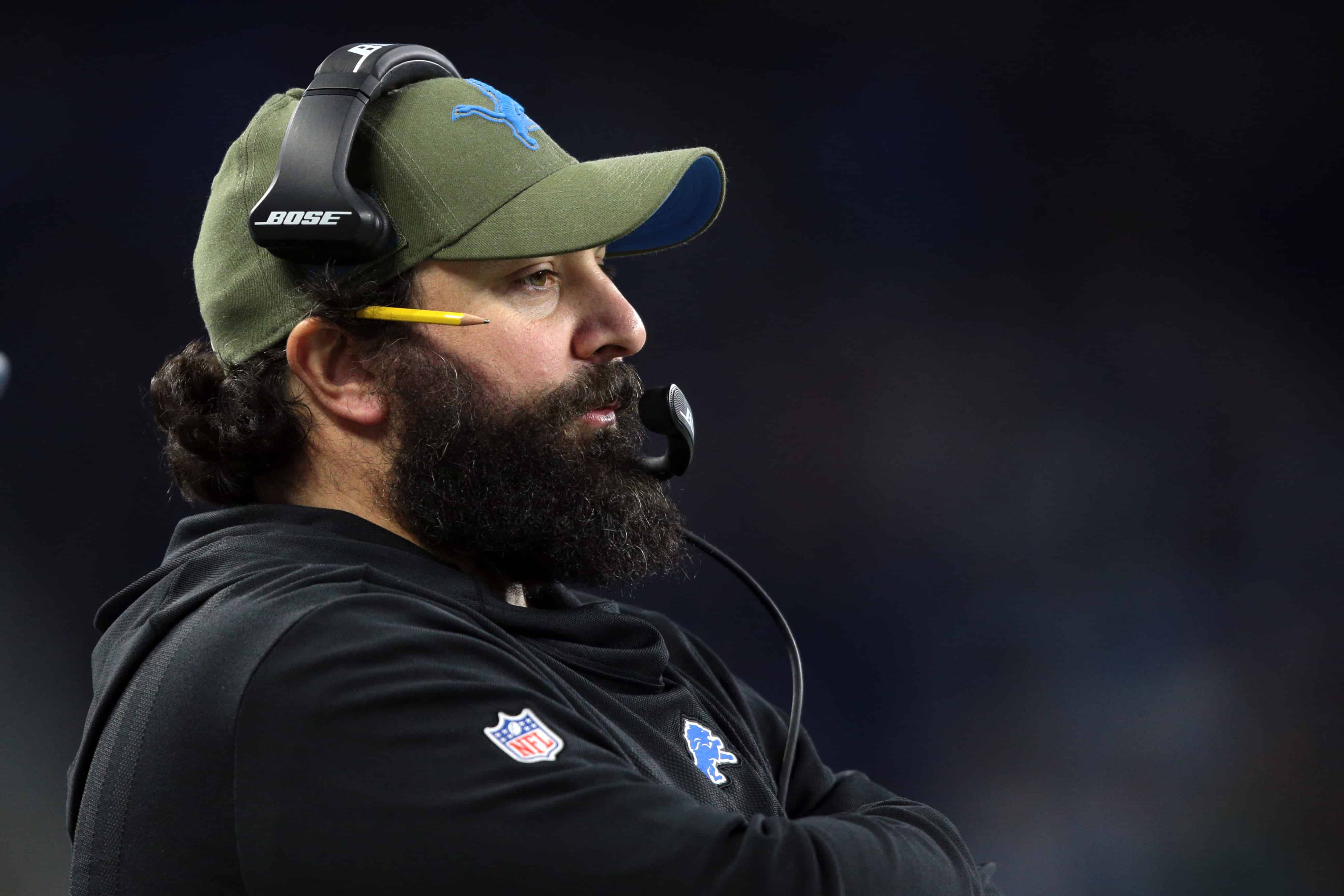Scientists test hypotheses by conducting experiments. Matt Patricia is an aeronautical engineer, so close enough. And he conducted an experiment with the 2018 Lions.
The 2017 Lions were the most pass-heavy team philosophically. On early downs in the first half, no team passed the ball more than the Lions. On all downs in the first three quarters, no team passed the ball more than the Lions. And they produced a 9-7 record for the second-straight year.
Back-to-back 9-7 records may not sound great to a franchise like the Patriots, but to the Lions, it was the only time they produced back-to-back winning records in over two decades, since 1995! Yet they fired their head coach, brought in Patricia, and decided to conduct a massive experiment.
Patricia wondered: what happens when a pass-oriented offense coming off consecutive nine-win season overhauls its philosophy to feature the run? Did adding better personnel at running back and along the offensive line to establish stronger rushing production generate a more efficient overall offense? Will play action work better? Will the passing game benefit? Will opponents blitz less because the Lions are running more? Will it be easier to pass on third down? Will it be easier to pass or more efficient to run in the red zone?
To all the teams with new coaches, who think they can come in and improve the entirety of the team by shifting to a more run-heavy approach, pay close attention:
The Lions’ experiment backfired.
Patricia’s 2018 Lions went 6-10, posting the organization’s worst record since 2012. In Patricia’s post-season press conference, he blamed the poor record on execution, citing coachspeak. “We can’t turn the ball over.” “We need to eliminate penalties.” “We all have to improve.” “It’s hard to win games in the NFL.”
We’re going to show why every single question above was answered with a decisive “no!” and truly understand the causes behind Detroit’s dismal 2018 season.
First: Did better running backs and offensive linemen produce a more efficient offense? Both the 2017 and 2018 Lions faced the NFL’s fourth-toughest schedules of defenses. The 2017 Lions ranked 12th in total offensive efficiency. Last year, Detroit ranked 23rd. The 2017 Lions offense ranked fifth in yards per play. Last year’s Lions ranked 20th. The 2017 Lions ranked 17th in third-down conversion rate. Last year’s Lions were 25th. The Lions’ run-game improvement and shift to a run-centric team made the offense worse.
Second: Did play action work better? Defenses became programmed to sell out to stop the Lions’ running game, opening up the play-action game. Right? Nope. Matthew Stafford averaged 10.2 yards per attempt with play-action versus 7.3 without it in 2017. In 2018, Stafford averaged 8.1 YPA with play-action and 6.5 YPA without it. For the Lions, play-action has worked better when they have rarely run the ball.
Third: Did a run-heavier philosophy assist the passing game? Did it become easier to pass because defenses were playing the run? Stafford produced a substantially worse 2018 season than he did in 2017. Let’s start with early downs in the first half. The Lions moved from the NFL’s pass-heaviest team in such scenarios in 2017 to 20th most pass-heavy in 2018. In 2017, Stafford averaged 7.3 yards per attempt with a 48% Success Rate and 94 passer rating on these downs. In 2018, he dropped to 6.7 YPA with a 91.3 rating. No, running more did not help Stafford.
Fourth: Did teams blitz the Lions less? Not really. Stafford’s overall blitz rate dropped mildly from 30% to 28%, but he was still blitzed at a rate above league average (27%). More remarkable was Stafford’s production against the blitz; his passer rating when blitzed fell from 93.2 to 79.8 in 2018, and his yards per attempt against the blitz plummeted from 8.1 to 6.7.
Fifth: Did running more make it easier to pass on third down? Nope. Stafford’s yards per attempt on third-down passes fell from 8.0 to 6.2, and his third-down passer rating sank from 110.7 to 76.8.
Sixth: Was it easier to pass in the red zone? No, the Lions fell from No. 10 to No. 24 in red-zone efficiency. In 2017, on early-down red-zone plays, Stafford produced a 97 passer rating, 50% completion rate, and 35% Success Rate. In 2018, Stafford’s passer rating was 87 with a 49% completion rate on early-down red-zone throws.
Seventh: Was it more efficient to run in the red zone? The 2017 Lions – with a talent-poor rushing attack featuring Ameer Abdullah and Theo Riddick – were successful on 50% of their red-zone runs, 5% above league average. The 2018 Lions – with second-round pick Kerryon Johnson and free agent signee LeGarrette Blount – were successful on just 46% of run plays, 4% below average.
![]()
In his year-ending press conference, Patricia was asked to address Stafford’s regression. “One part of the offense I thought was really improved was the run game, which was obviously a big part of the questioning that I got when I first got here,” Patricia stated. “And that's half of the game, you know, so I'll take that as a positive and we'll build from there.”
It was a perfect politician’s answer: Ignore the negative, even if it is the entirety of the question, and speak only about topics that reflect positively on you. And Patricia’s claim that running the ball is “half of the game” is a major red flag. Not only do teams pass far more than they run, but passing efficiency is roughly four times more correlated to win-loss outcomes. The run game is nowhere near equally important as the passing game.
Patricia was also asked about the NFL being a passing league and whether he thought the Lions were falling behind due to his run-first mentality. “You know what’s interesting,” Patricia replied. “Most of the teams that win in the playoffs are running the ball and winning the big games in the end. Teams that can run the ball, stop the run, and control the game towards the end of the season are really the teams that will have the most chance to win. There is a fundamental philosophy that I do believe with the run game and stopping the run and covering kicks, and that is true. And that’s held true so far through the course of seasons.”
With all due respect, Patricia has no clue how teams win games in the modern passing era.
If I were a Lions fan, I would be beyond frightened. My hair would be bristling to hear Patricia speak about football philosophy. I’d be cringing like the Cowardly Lion from the Wizard of Oz.
Despite improving the personnel along the offensive line and at running back, and maintaining the same quarterback with similar starting receivers, the offense regressed in massive ways across multiple disciplines. And because of the offensive decline, even though Patricia (a defensive coach) brought better defensive schemes to his side of the ball, a back-to-back 9-7 team posted a terrible 6-10 record.
And it was primarily because of the shift to the run.
This is how you turn a winning team into a losing one. This is how you fail your players and your fans.
Will Patricia allow the 2019 offense to pass more because it is more efficient after seeing how the run-centric shift sunk his 2018 Lions? Or will he stick to outdated football-guy clichés that were true decades ago but are plainly wrong in today’s NFL?
If Patricia truly wants what’s best for his team, we’ll see the 2019 Lions revert to a passing-focused offense. If he sticks with a run-based mentality, he will be putting his dinosaur beliefs ahead of giving his team the best chance to win. It’s on him.
















